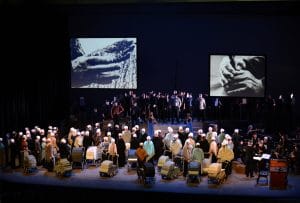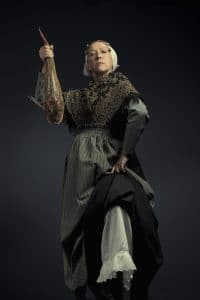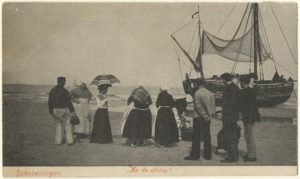The Zuiderstrand Theatre got it right. When the theatre was built on the coast, there was a lot of resistance and grumbling from Scheveningers. 'That bunker' it was called. But with the (reprise) hit 'Hard Hands', free after Heijermans 'Hoping for a blessing', this in-house production hits a nerve.
For and by Scheveningen
A lot has changed at Scheveningen. The fishing village with the sound of the surf and the smell of the sea has been swallowed up by big bad neighbour The Hague. In place of fishermen and fisherwomen, busy with fish, boats and nets, came a coastline, crammed with 'concrete props'. Yet the memory of yesteryear is alive and well. When 'Hard Hands' first premiered two years ago, there were weeping women in the audience. Many have relatives who 'stayed at sea'. After a run-through of the second half, I spoke to a lady in the choir who could not invite her mother-in-law. "She really wouldn't be able to handle this."
Classic in a new look
Writer Bouke Oldenhof smoothly weaves indignation at the lost village of yesteryear through Heijermans classic piece from 1900. Historian Hans Goedkoop, who wrote the biography 'luck' wrote about Heijermans, is not 100 per cent convinced whether the play is set in Scheveningen or in Katwijk. The fact is that 'Op hoop van zegen' comes across and has eloquence in this adaptation. Not least because so many residents are involved. Half of the choir lives in Scheveningen. People greet each other on the street with the cry 'Hey hard hands!'

During the walk-through I visit, the children of theatre school Rabarber and the Residentieorkest musicians are not present. Even then, I count at least 50 people on stage! So, like the fisherwomen in the play, all the players have to wait a lot during rehearsals. Director Pieter Kramer has several right hands running around to help. But even then, it is a huge undertaking. The conversations between stage and stage are about "not too modern glasses", fishing nets that get snagged on the set and, to everyone's amusement, about "the pole" being lost. And how do you tell a choir member that she is drawing far too much attention without stepping on her toes? It is tactfully navigating between details and content, on the turbulent waves of such a large music theatre production with professionals and amateurs of all shapes and sizes.

The fish is paid dearly
Absolutely worth seeing is Loes Luca in her great tragic role Kniertje. This is undoubtedly the most famous female stage character in Dutch repertoire history. Everyone knows that there is something 'with a pan' or knows the phrase " The fish is paid dearly". Widow Kniertje Vermeer lost her husband and two sons at sea. Her last two sons, Barend and Geert, join her on the broke ship with the wry name 'Op hoop van zegen'. Kniertje herself depends on the shipowner's family Bos, where she cleans. The shipowner's daughter brings her a pan of soup when she is ill and cannot come to clean. In short, Kniertje is an old woman, beaten by fate and still believing in God.
"Vertelle? 'Life at sea is not a tale."
Luca gives her Kniertje a pleasantly down-to-earth, light-hearted edge. But then when she mourns, at the corpse of her Barend, it arrives like a sledgehammer blow and I wonder how many visitors will not keep it dry this year. With a lump in my throat, I leave the auditorium. Outside, I hear the surf.
Directed Pieter Kramer Text Bouke Oldenhof (with text contributions by Hans Dorrestijn) Music Willem Breuker et al. Musical direction Rick Schoonbeek and Boudewijn Ruigrok With Loes Luca, Lester van Olffen, Jeffrey Boekestijn, Jennifer Welts, Julia van der Vlugt, Koos Sekrève, Bas Muijs, Residentie Orkest, Theaterschool Rabarber, Kwekers in de kunst, Theatre Choir Dario Fo and the project choir of more than 100 Scheveningers
Hard Hands is a production of Zuiderstrand Theatre and Growers in the arts

